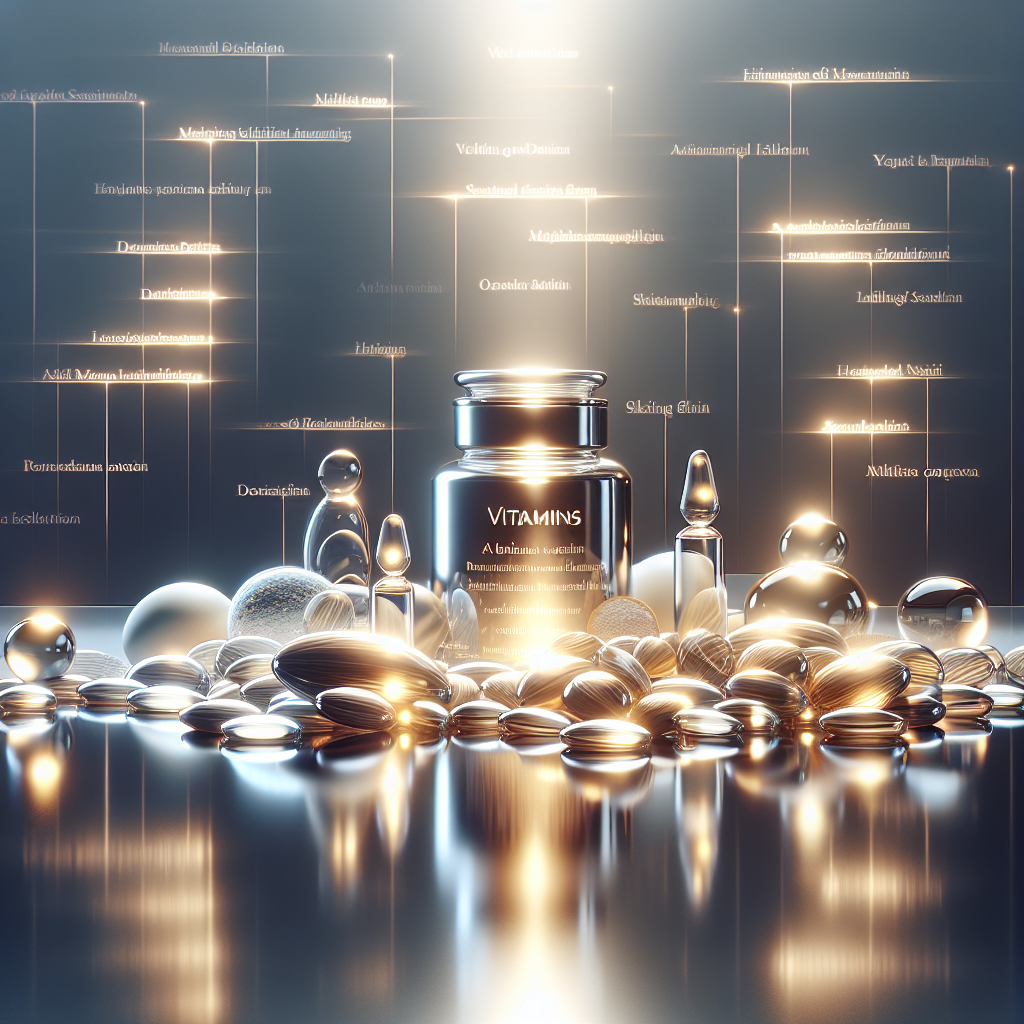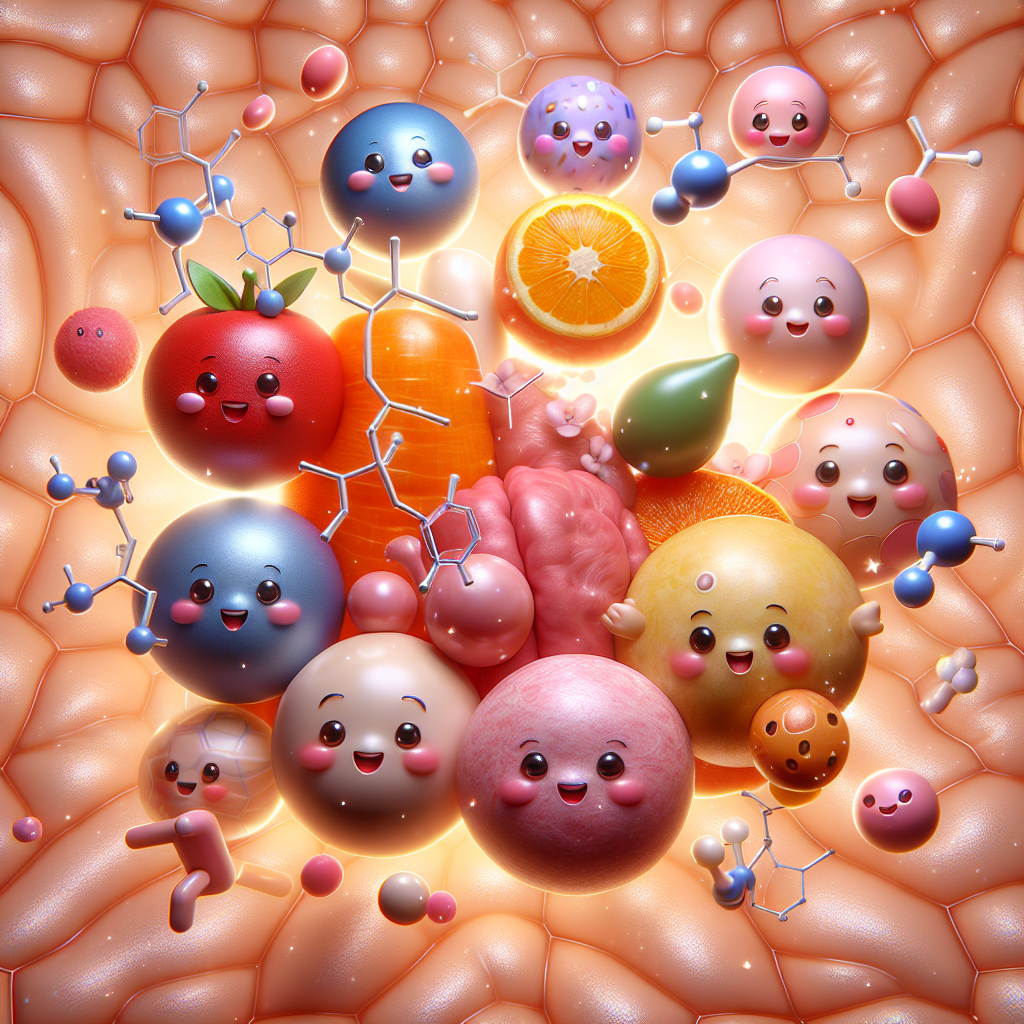Vitamins That Keep Skin Looking Youthful

Discover the secret to youthful skin with our range of vitamins. Don’t let age define your beauty. Visit My Vibrant Vitality now and start your journey towards a healthier, younger-looking skin.
Essential Vitamins for Maintaining Youthful Skin
The quest for youthful, radiant skin is a universal pursuit that transcends age, gender, and culture. While many turn to expensive creams, serums, and even surgical procedures to maintain a youthful appearance, the secret to healthy, glowing skin may lie in something much simpler: vitamins. Indeed, certain vitamins play a crucial role in skin health, helping to combat the signs of aging and keep skin looking youthful.
Vitamin A, for instance, is a potent antioxidant that helps to fight off free radicals, unstable molecules that can cause damage to cells and contribute to aging. It also promotes cell turnover, helping to slough off dead skin cells and reveal the fresh, new skin underneath. This can help to reduce the appearance of fine lines and wrinkles, giving the skin a smoother, more youthful appearance. Vitamin A can be found in foods like sweet potatoes, carrots, and spinach, but it can also be applied topically in the form of retinoids, a type of vitamin A derivative that has been shown to be particularly effective in treating signs of aging.
Vitamin C is another essential vitamin for maintaining youthful skin. It plays a key role in the production of collagen, a protein that gives skin its elasticity and firmness. As we age, our bodies produce less collagen, leading to sagging skin and wrinkles. By boosting collagen production, vitamin C can help to keep skin firm and wrinkle-free. It also has antioxidant properties, helping to protect the skin from damage caused by environmental factors like sun exposure and pollution. Vitamin C can be found in a variety of fruits and vegetables, including oranges, strawberries, and bell peppers, and it can also be applied topically in the form of serums and creams.
Vitamin E is another powerful antioxidant that can help to protect the skin from damage. It helps to moisturize the skin, keeping it hydrated and preventing dryness and flaking. It also helps to repair damaged skin cells, promoting healing and reducing the appearance of scars and blemishes. Vitamin E can be found in foods like nuts, seeds, and leafy green vegetables, and it can also be applied topically in the form of creams and oils.
Finally, vitamin K is often overlooked but is essential for maintaining youthful skin. It plays a crucial role in the body’s blood clotting process, which can help to heal wounds and reduce the appearance of bruises. It can also help to reduce the appearance of dark circles under the eyes, a common sign of aging. Vitamin K can be found in foods like kale, spinach, and broccoli, and it can also be applied topically in the form of creams and serums.
In conclusion, vitamins play a crucial role in maintaining youthful, healthy skin. By incorporating foods rich in vitamins A, C, E, and K into your diet, and considering topical applications, you can help to combat the signs of aging and keep your skin looking radiant and youthful. However, it’s important to remember that while vitamins can help to improve skin health, they are not a substitute for a healthy lifestyle. Regular exercise, a balanced diet, adequate sleep, and proper hydration are all essential for maintaining healthy skin.
The Role of Vitamins in Skin Rejuvenation and Anti-Aging

The quest for youthful, radiant skin is a universal pursuit that transcends age, gender, and culture. While many turn to expensive creams, serums, and even surgical procedures to maintain a youthful appearance, the role of vitamins in skin rejuvenation and anti-aging is often overlooked. Vitamins, both when ingested through diet and applied topically, can play a significant role in preserving the skin’s youthful glow and delaying the onset of aging signs.
Vitamin A, also known as retinol, is one of the most potent vitamins for skin rejuvenation. It stimulates the production of new skin cells, replacing the old, damaged ones, and promoting a smoother, more even skin tone. Retinol also boosts collagen production, a protein responsible for the skin’s elasticity and firmness. As we age, our collagen production naturally decreases, leading to wrinkles and sagging skin. By stimulating collagen production, retinol can help to counteract these effects, maintaining the skin’s youthful firmness and elasticity.
Next in line is Vitamin C, a powerful antioxidant that protects the skin from harmful free radicals. Free radicals are unstable molecules that can damage the skin cells, leading to premature aging. Vitamin C neutralizes these harmful molecules, preventing them from causing damage. Additionally, Vitamin C plays a crucial role in collagen synthesis, helping to maintain the skin’s firmness and elasticity. It also brightens the skin and fades dark spots, contributing to a more youthful and radiant complexion.
Vitamin E, another potent antioxidant, works hand in hand with Vitamin C to protect the skin from free radical damage. It also has moisturizing properties, helping to keep the skin hydrated and plump, which can reduce the appearance of fine lines and wrinkles. Moreover, Vitamin E has anti-inflammatory properties, which can soothe and calm irritated skin, contributing to a healthier, more youthful appearance.
Vitamin B3, or niacinamide, is another key player in skin rejuvenation. It improves the skin’s barrier function, helping to lock in moisture and keep out irritants. This can result in smoother, more hydrated skin, which can appear more youthful. Niacinamide also reduces redness and blotchiness, promoting a more even skin tone.
Lastly, Vitamin K is known for its ability to improve the appearance of dark circles and bruises, making it a valuable addition to any anti-aging skincare routine. It works by aiding the body’s process of blood clotting, which can help to reduce the appearance of dark circles and bruises.
In conclusion, vitamins play a crucial role in skin rejuvenation and anti-aging. They stimulate the production of new skin cells, boost collagen production, protect against free radical damage, improve the skin’s barrier function, and even aid in blood clotting. By incorporating these vitamins into your skincare routine and diet, you can help to maintain your skin’s youthful glow and delay the onset of aging signs. However, it’s important to remember that while vitamins can significantly contribute to skin health, they should be used in conjunction with a balanced diet, regular exercise, and adequate sleep for optimal results.
Unlocking the Secret to Youthful Skin: Top Vitamins You Need
Unlocking the secret to youthful skin is a quest that has been pursued by many for centuries. In the modern era, we have discovered that the key to maintaining a youthful appearance lies not in elusive elixirs, but in the nutrients we consume. Among these, vitamins play a pivotal role in keeping our skin looking fresh, vibrant, and youthful.
Vitamin A, often found in foods like sweet potatoes, carrots, and spinach, is one of the most essential vitamins for skin health. It promotes cell production, aiding in the growth of healthy, new skin cells. This process is crucial in maintaining a youthful appearance as it helps to keep the skin firm and radiant. Moreover, Vitamin A has been found to fight against the effects of aging by reducing wrinkles and fine lines, making it a vital component in many anti-aging skincare products.
Next in line is Vitamin C, a potent antioxidant that is renowned for its ability to protect the skin from harmful free radicals. These free radicals, often a result of exposure to pollution and UV rays, can cause significant damage to the skin, leading to premature aging. By neutralizing these harmful particles, Vitamin C helps to maintain the skin’s health and youthful appearance. Additionally, it plays a crucial role in collagen production, a protein that gives the skin its elasticity and firmness. Foods rich in Vitamin C include citrus fruits, strawberries, and bell peppers.
Vitamin E, another powerful antioxidant, works hand in hand with Vitamin C to protect the skin from damage. It helps to keep the skin hydrated and reduces inflammation, which can lead to a dull and aged appearance. Vitamin E can be found in foods like nuts, seeds, and leafy green vegetables.
Vitamin K is another essential nutrient for skin health. It is known for its ability to improve the skin’s elasticity and reduce the appearance of wrinkles and fine lines. Vitamin K also plays a significant role in the body’s blood clotting process, which can help to heal wounds and bruises more quickly. Foods rich in Vitamin K include leafy green vegetables, broccoli, and Brussels sprouts.
Lastly, the B-vitamins, particularly B3 (niacin) and B5 (pantothenic acid), are crucial for maintaining a youthful appearance. They help to retain moisture, reduce redness and uneven skin tone, and improve the skin’s elasticity. Foods rich in B-vitamins include whole grains, eggs, and lean meats.
In conclusion, maintaining a youthful appearance is not just about the skincare products we apply externally, but also about the nutrients we consume. A balanced diet rich in vitamins A, C, E, K, and B can significantly contribute to keeping our skin looking fresh, vibrant, and youthful. However, it’s important to remember that while vitamins are essential for skin health, they are just one piece of the puzzle. Regular exercise, adequate sleep, and proper hydration are also crucial components of a comprehensive skincare regimen. So, the next time you’re looking for the secret to youthful skin, remember to look not just in your bathroom cabinet, but also in your kitchen.